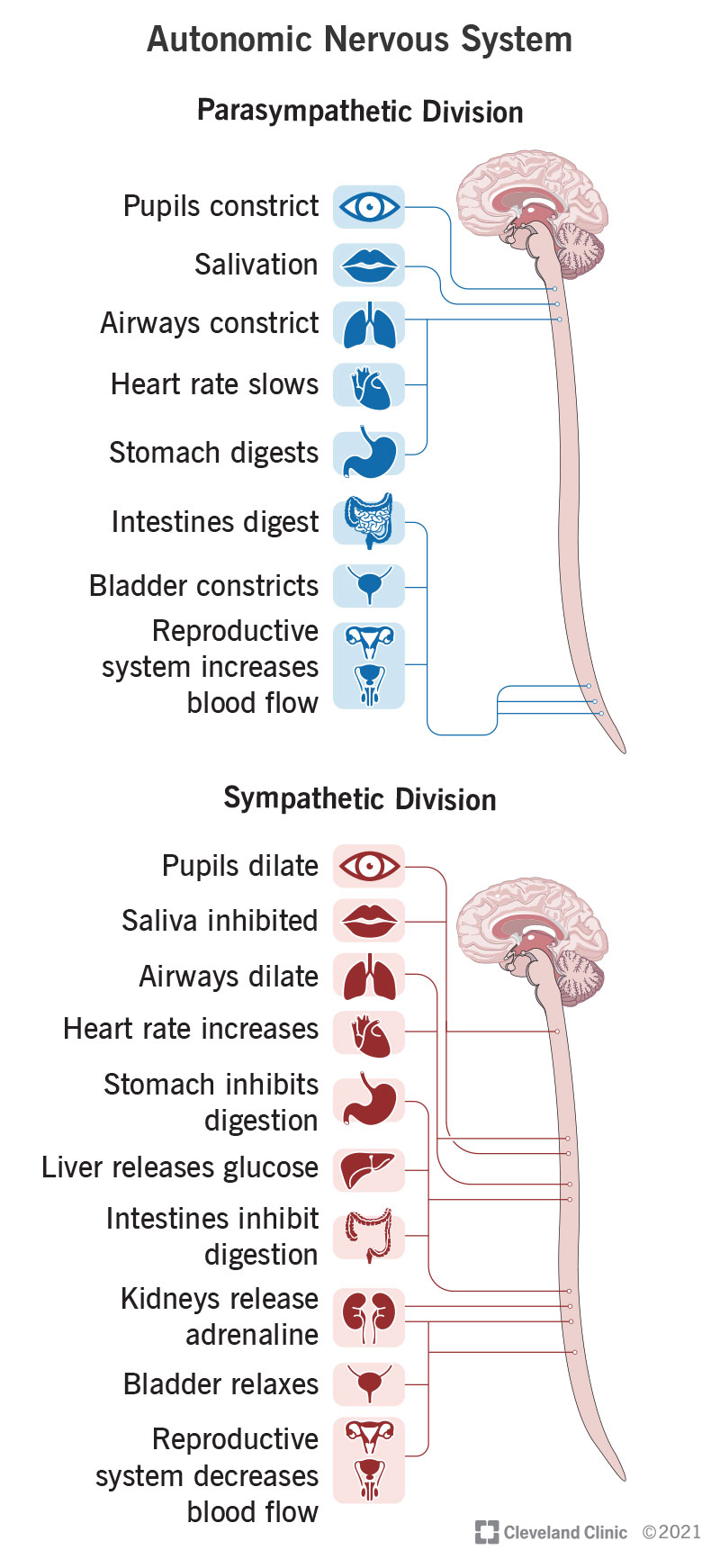Your autonomic nervous system is a network of nerves throughout your body that control unconscious processes. These are things that happen without you thinking about them, such as breathing and your heart beating. Your autonomic nervous system is always active, even when you’re asleep, and it’s key to your continued survival.
Advertisement
Cleveland Clinic is a non-profit academic medical center. Advertising on our site helps support our mission. We do not endorse non-Cleveland Clinic products or services. Policy

Your autonomic nervous system is a part of your overall nervous system that controls the automatic functions of your body that you need to survive. These are processes you don’t think about and that your brain manages while you’re awake or asleep.
Advertisement
Cleveland Clinic is a non-profit academic medical center. Advertising on our site helps support our mission. We do not endorse non-Cleveland Clinic products or services. Policy
Your overall nervous system includes two main subsystems:
Your peripheral nervous system also has two subsystems:
Your autonomic nervous system breaks down into three divisions, each with its own job:
Advertisement
Much like a home needs electrical wiring to control lights and everything inside that needs power, your brain needs the autonomic nervous system’s network of nerves. These nerves are the physical connections your brain needs to control almost all of your major internal organs.
Your autonomic nervous system has the following effects on your body’s systems:
Your autonomic nervous system includes a network of nerves that extend throughout your head and body. Some of those nerves extend directly out from your brain, while others extend out from your spinal cord, which relays signals from your brain into those nerves.
There are 12 cranial nerves, which use Roman numerals to set them apart, and your autonomic nervous system has nerve fibers in four of them. These include the third, seventh, ninth and 10th cranial nerves. They manage pupil dilation, eye focusing, tears, nasal mucus, saliva and organs in your chest and belly.
Advertisement
Your autonomic nervous system also uses most of the 31 spinal nerves. These include spinal nerves in your thoracic (chest and upper back), lumbar (lower back) and sacral (tailbone).
The spinal nerve connections are how your autonomic system controls the following:
The part of your brain that runs autonomic functions is your hypothalamus. This structure isn’t part of your autonomic nervous system, but is a key part of how it works.
Your autonomic nervous system has a similar makeup to your overall nervous system. The main cell types are as follows, with more about them listed below:
Advertisement
Each neuron consists of the following:
The dendrites on a single neuron may connect to thousands of other synapses. Some neurons are longer or shorter, depending on their location in your body and what they do.
Glial (pronounced “glee-uhl”) cells do several different jobs. They help develop and maintain neurons when you’re young and manage how neurons work throughout your life. They shield your nervous system from infections, control the chemical balance in your nervous system and coat neurons’ axons with myelin. There are 10 times more glial cells than neurons.
There are many conditions and causes of autonomic neuropathy, which means damage or disease that affects your autonomic nervous system. Common examples include:
Advertisement
The symptoms of autonomic nervous system conditions depend on the location of the damage. With conditions like Type 2 diabetes, the damage can happen in many places throughout your body. The most likely symptoms of autonomic nervous system damage include:
Several tests can help in diagnosing autonomic nervous system problems. These include:
The treatments for autonomic nervous system conditions can be very specific, depending on the condition in question. Some of them might treat the condition itself or an underlying cause. Others might only treat symptoms of the condition, especially when there’s no cure or treatment for the condition. That means there isn’t a one-treatment-fits-all approach to these conditions. Medications can help with some of these conditions, but not all of them.
Prevention of autonomic nervous system damage is the best way to avoid conditions that affect that system. The best preventive actions you can take include:
Your autonomic nervous system is a vital part of how you live your life. You don’t even have to think about it most of the time and it will keep doing its job. Taking care of your body, especially your nervous system, is the best way to avoid conditions that can cause autonomic nerve damage. That way, you can keep focusing on what you want to pay attention to in your life.
If you have a neurological condition, you want expert advice. At Cleveland Clinic, we’ll work to create a treatment plan that’s right for you.

Last reviewed on 06/15/2022.
Learn more about the Health Library and our editorial process.